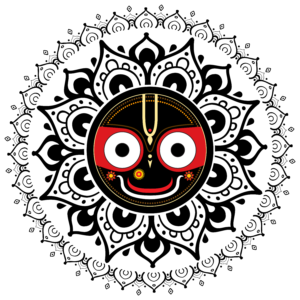(House of Bhakti) – Lord Śiva’s highest benediction | House of Bhakti
Chapter 1 from the book Śiva-Tattva: Lord Śiva’s Highest Benediction by Śrīla Bhaktivedānta Nārāyaṇa Mahārāja
Once, the great sage Nārada Muni travelled to the abode of Lord Śiva and began to glorify him, saying, “You are very near and dear to the Supreme Lord Kṛṣṇa. Not only that, you are Kṛṣṇa’s manifestation; you are non-different from Him. You can give liberation and also kṛṣṇa-prema, the rare jewel of transcendental love for Kṛṣṇa.”
Hearing Nārada glorify him in numerous ways, Lord Śiva became angry and said, “Your glorification of me is false. I am not at all dear to Śrī Kṛṣṇa.”
Lord Śiva is actually most dear to Śrī Kṛṣṇa, and therefore Kṛṣṇa can give him services which He cannot give anyone else. When the demigods and demons were churning the Milk Ocean in order to obtain the nectar of immortality, the first substance produced was a powerful and dangerous poison, burning the entire world. The demigods appealed to Śrī Kṛṣṇa, and He advised them to request Lord Śiva to drink the poison. Thus, they worshipped Lord Śiva and prayed, “Please save us! Only you can protect us!” Lord Śiva collected the poison and took it in his mouth, but he hesitated to swallow it, considering, “Lord Kṛṣṇa is in my heart. The poison will affect Him.” He therefore kept the poison in his throat, which was burned, and his neck turned the colour blue.
Now, out of genuine humility, Lord Śiva told Nārada: “I want to be His beloved devotee, but actually I am not. You know that I always wear ashes from the burial grounds and a garland of skulls. All my associates are ghosts and witches, so I am not qualified to be Kṛṣṇa’s dear devotee. If I am so dear to Him, why would He have ordered me to engage with the mode of ignorance in the terrible function of destroying the universe? If I am such a great recipient of His mercy, why would he have ordered me to become Śaṅkarācārya and preach a philosophy that is adverse to Him?”
Actually, although he expressed otherwise, it was because Śiva is so dear to Kṛṣṇa that Kṛṣṇa was able to give him the difficult task of appearing as Śaṅkarācārya.* Many people had been worshipping the Supreme Lord only to fulfil their selfish purposes, thinking, “Simply by our worship of God, He will be pleased with us and satisfy all our worldly desires.” They worshipped Him only so that He would rapidly arrange for all of their needs, not to please Him. Lord Kṛṣṇa thought, “This is very dangerous.” He called Lord Śiva and instructed him, “Such false devotees will create great disturbances, so keep them far away from Me. Create a philosophy which teaches, ‘brahma satyaṁ jagan mithyā – the Absolute is true, this world is false.’ You should preach, ‘All souls are Śiva; all souls are Brahmā; all are one. You are brahma, the impersonal Absolute. There is no need to worship any other God; you are the Supreme God.’ ” Reluctant, Lord Śiva asked Kṛṣṇa, “Can you please tell someone else to do this? I am not qualified for this service.” Kṛṣṇa replied, “No, you will have to do this. In the entire world, I see no one else who is as capable.”
Feeling ashamed, Lord Śiva now told Nārada, “At last, I had to agree to follow His order. Appearing as Śaṅkarācārya I preached everywhere, ‘You are brahma, you are brahma, you are the impersonal brahma. The entire world is false.’ I am so much regretting this. I know I have committed a great offence by causing so many people to be averse to Lord Kṛṣṇa. Still, to carry out His order I spread this doctrine. It is clear by the fact that He sometimes gives me such orders that I am not His dearest one.”
Lord Śiva also expressed to Nārada his regret in having given benedictions to Lord Kṛṣṇa’s enemies. To fulfil his Lord’s desires, he had given benedictions to demons like Rāvaṇa, Vṛkāsura, Śālva and Jayadratha, and thus he had performed many activities that were seemingly opposed to Kṛṣṇa and kṛṣṇa-bhakti.
Nārada Muni said, “Master, please don’t try to mislead me. I know that whatever you do is to please Lord Kṛṣṇa and to assist Him in His pastimes, for the benefit of all beings. You told me that you have many times given benedictions to His enemies. I know that His enemies, as well as the enemies of His devoted cousins, the Pāṇḍavas, worship you for ill-motivated benedictions. I also know that you grant them benedictions. But those benedictions are not foolproof; they always have some loophole. Actually, you cheat these beneficiaries in order to please Lord Kṛṣṇa. You are undoubtedly His dearest friend.”
Śiva and Nārada continued to discuss some historical incidents which, according to Śiva, proved that he was not dear to Kṛṣṇa – but according to Nārada, proved the opposite.
The great epic Mahābhārata tells of King Jayadratha, one of the many demons who received such a clever benediction from Lord Śiva. Duryodhana, the paternal cousin of the five Pāṇḍava brothers, had given his sister Dushala in marriage to King Jayadratha, and therefore the king had also become like a brother-in-law of the Pāṇḍavas. Once, Jayadratha tried to kidnap the Pāṇḍavas’ wife, Draupadī, desiring strongly to make her his own wife. As he forced her onto his chariot, she admonished him, crying, “I am the wife of the Pāṇḍavas. When they catch you, they will punish you and kill you!”
Jayadratha’s arrogance prevented him from hearing her, and he continued his abduction. Meanwhile, the sage Nārada approached the Pāṇḍavas and informed them, “Oh, I saw Jayadratha taking away Draupadī, and she was weeping!”
Two of the Pāṇḍavas, Bhīma and Arjuna, immediately chased after Jayadratha. Bhīma dismounted his chariot and ran faster than Jayadratha’s horses. With his bow and arrows, Arjuna created a fire that surrounded the chariot of Jayadratha, who was then captured and could not move. Severely beaten by Bhīma and arrested by Arjuna, Jayadratha was bound to the chariot and taken to where Yudhiṣṭhira Mahārāja had been staying with Draupadī.
Bhīma and Arjuna spoke to Yudhiṣṭhira, their respected senior brother. Bhīma urged him, “I want to kill Jayadratha. Please order me to kill him.”
In support of Bhīma, Arjuna said, “Jayadratha has performed a heinous act and should be killed.”
King Yudhiṣṭhira replied, “The offence was committed against Draupadī. We should take the case to her, and we will do whatever she orders.”
When Jayadratha was brought to the feet of Draupadī, she mercifully told her husbands, “Don’t kill him; forgive him. He is our brother-in-law.
If you kill him, your cousin-sister will be widowed and she will weep for the rest of her life.”
Bhīma and Arjuna then approached Lord Kṛṣṇa and appealed to Him: “What should we do? We have vowed to kill Jayadratha, and now Draupadī tells us to forgive him.”
Kṛṣṇa replied, “For one who has been honoured, dishonour is worse than death.”
Arjuna then shaved King Jayadratha’s head, leaving five patches of hair, and he shaved one side of his face, leaving the other side unshaven. Jayadratha felt humiliated, and after being released by Bhīma and Arjuna he considered it better to have died. He thought, “I will somehow take revenge.” Thus absorbed, he went to Gangotrī in the Himālayas and undertook a severe type of penance to please Lord Śiva.
After some months he gave up all food, water, and bodily activities, and was about to die. At this point Lord Śiva came before him and asked what boon he wanted as a result of his austerity. Jayadratha replied, “I want revenge against the Pāṇḍavas. I want to defeat and kill all of them.” Lord Śiva told him, “You can defeat the Pāṇḍavas, but only Yudhiṣṭhira, Bhīma, Nakula and Sahadeva; not Arjuna.” Jayadratha said, “If you cannot benedict me to my full satisfaction, then please grant that neither Arjuna nor anyone else will be able to kill me.” Lord Śiva replied, “I can grant you this: if your head is severed and falls on the ground, the person who caused this will die immediately. Your life will be saved and your head will rejoin your body. You may be ‘killed’ hundreds of thousands of times, but you will not die. On the other hand, if your severed head falls into your father’s hands and he throws it on the ground, then you will die.” Jayadratha was satisfied, thinking, “My father would never do this.”
When the battle of Kurukṣetra began, Jayadratha took the side of the Pāṇḍavas’ enemy, Duryodhana. One 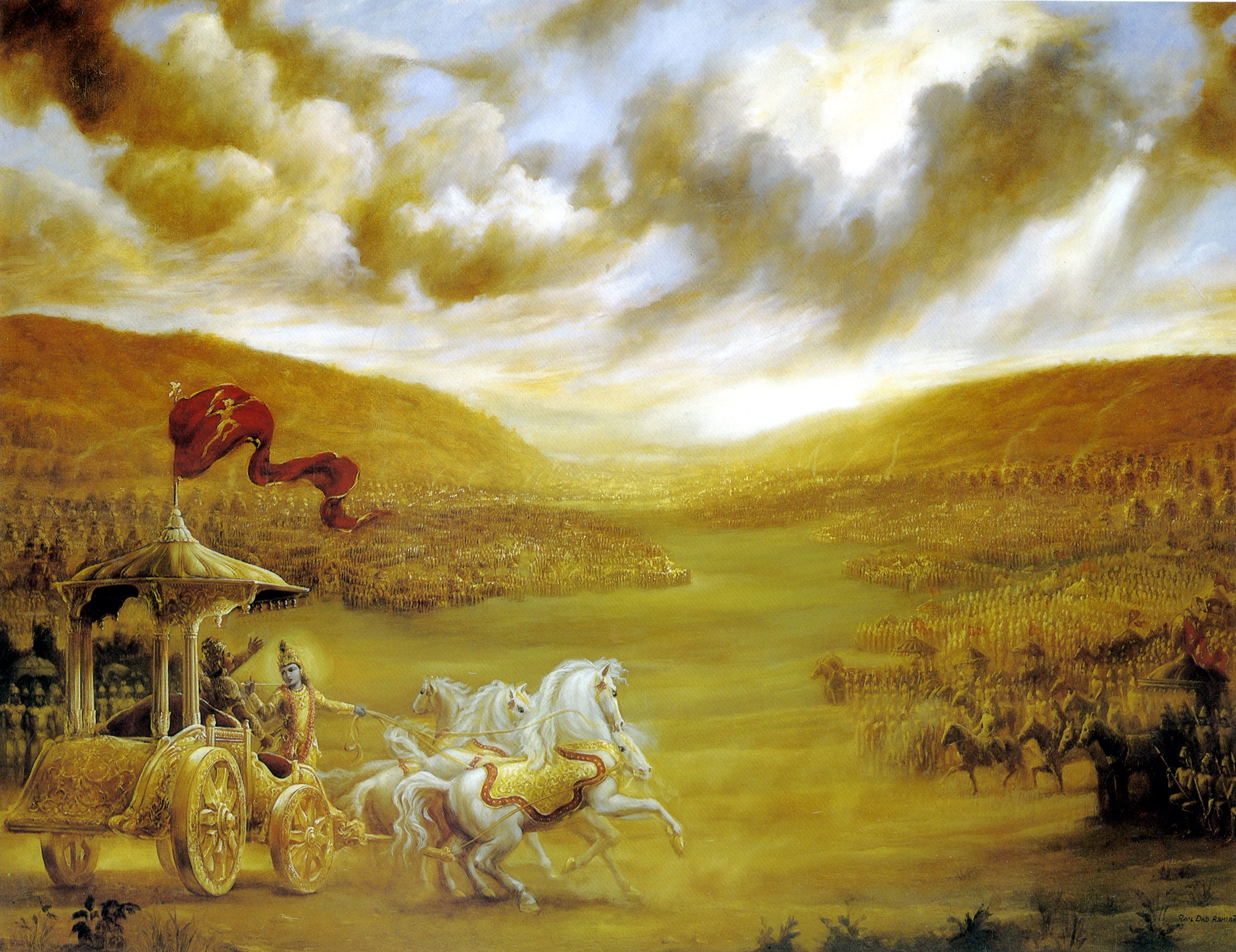 evening during the battle, as the sun was setting, Jayadratha’s father was absorbed in prayer and making an offering of water to the Sun god. Arjuna saw this opportune moment. With the skilful release of an arrow, he severed Jayadratha’s head from his body and caused it to fall into the hands of his meditating father. Startled and without thought, Jayadratha’s father tossed the head on the ground. Then, opening his eyes he exclaimed, “What was that wet thing?” Seeing that he had just thrown his son’s head, he began to cry, “Oh my son! Oh my son! You are dead now!”
evening during the battle, as the sun was setting, Jayadratha’s father was absorbed in prayer and making an offering of water to the Sun god. Arjuna saw this opportune moment. With the skilful release of an arrow, he severed Jayadratha’s head from his body and caused it to fall into the hands of his meditating father. Startled and without thought, Jayadratha’s father tossed the head on the ground. Then, opening his eyes he exclaimed, “What was that wet thing?” Seeing that he had just thrown his son’s head, he began to cry, “Oh my son! Oh my son! You are dead now!”
Envious of Kṛṣṇa and with a desire for the strength to destroy him, the demon Śālva also took shelter of Lord Śiva. He performed a severe type of austerity and ate no more than a handful of ashes daily. After one year, Lord Śiva became pleased with him and asked him to beg for a boon.
Śālva begged Lord Śiva for the gift of an aeroplane, saying, “This aeroplane should perform as I wish; it should be operated by my mind. On my order it should go to heaven or anywhere I desire. In summer it should be air-conditioned. If there are only two men, there should only be two seats, and if I want to travel with hundreds of thousands of people, many seats should manifest. It should never crash due to mechanical difficulty, and it should be equipped with all varieties of weapons. It should be dangerous and fearful to the Yadus.”
Lord Śiva agreed, and Śālva was helped by the demon Maya Dānava to manufacture a mystical aeroplane that began to destroy Dvārakā, Lord Kṛṣṇa’s abode. Śālva personally attacked from above, and his soldiers attacked on the ground. Headed by Pradyumna, the Yadu dynasty warriors fought with Śālva and his army, but they could not defeat him.
Finally, Lord Kṛṣṇa personally appeared on the battlefield, and after much intense fighting on both sides and many mystic displays by Śālva, the Lord took up His disc, cut off the demon’s head, and gave him liberation.
In this way, the benedictions given by Lord Śiva to the enemies of Lord Kṛṣṇa always have a weak point – a loophole. Lord Śiva is extremely clever, and he is always serving his Lord, Śrī Kṛṣṇa. Nārada knew this fact, and he wanted to publicize Lord Śiva’s glories. Śiva is very near and dear to Kṛṣṇa, and non-different from Him. Try to always honour him, for he is Kṛṣṇa’s greatest devotee.
nimna-gānāṁ yathā gaṅgā
devānām acyuto yathā
vaiṣṇavānāṁ yathā śambhuḥ
purāṇānām idam tathā
Śrīmad-Bhāgavatam (12.13.16)
Just as the Gaṅgā is the greatest of all rivers, Lord Acyuta [Kṛṣṇa] the supreme among deities and Lord Śambhu [Śiva] the greatest of Vaiṣṇavas, so Śrīmad-Bhāgavatam is the greatest of all Purāṇas.
The principle of Śiva – śiva-tattva – is extremely complex. The principle of Brahmā is not as complicated, because Lord Brahmā is always a jīva, a finite spirit soul. Sometimes, when there is no qualified jīva, Lord Viṣṇu (Kṛṣṇa’s expansion) personally takes the post of Brahmā, but that is rare. Lord Śiva is not like that; he is not a finite soul.
After passing through the eight material coverings, and after crossing the Virajā (the river that divides the material world and the spiritual world) and the planet of Lord Brahmā (the highest material planet), one comes to the planet of Śiva. There he is known as Sadāśiva, a manifestation of Lord Viṣṇu.
Śiva-tattva can be understood by the analogy of yoghurt and milk. Yoghurt is nothing but a transformation of milk. Milk can become yoghurt, but yoghurt cannot become milk. This analogy is found in Brahma-saṁhitā and elucidated in Śrīla Jīva Gosvāmī’s commentary: “Just as milk is transformed into yoghurt by contact with a transforming agent, Śrī Govinda, Lord Śrī Kṛṣṇa, similarly accepts the form of Śambhu (Śiva) in order to accomplish a specific purpose. The example of yoghurt is actually given in order to convey the idea of cause and effect, not the idea of transformation. Śrī Kṛṣṇa is reality and cannot be transformed, so it is not possible for Him to undergo any kind of distortion. A wish-fulfilling gem manifests many things according to one’s desire, yet its constitutional nature remains untransformed.”**
When Śrī Rāmacandra was making the bridge to Laṅkā, he established a Śiva-liṅga (deity form of Śiva) called 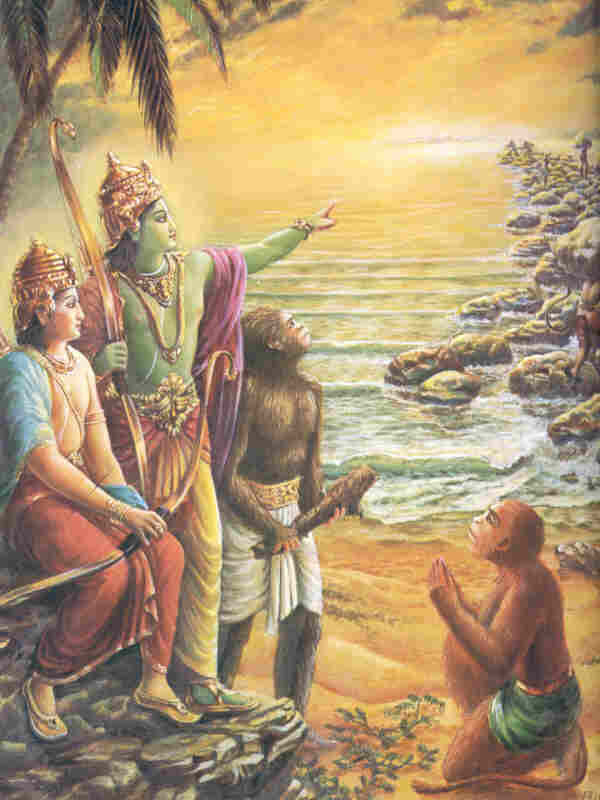 Rāmeśvara. All the common people began glorifying Lord Śiva, shouting, “Rāmeśvara ki jaya! You are Rāma’s īśvara: you are the lord of Rāma.” The demigods were unsatisfied by this and announced through an arial voice, “Rāmas ca asau īśvaraḥ: Rāma is God, and Śaṅkarā is also God; they are the same.” Hearing this, the Śiva-liṅga broke. Lord Śiva emerged from the liṅga and told them all, “You are all foolish; you do not know my tattva, the established truths regarding my identity. Rāma is my beloved and my God, and that is why I am called Rāmeśvara.”
Rāmeśvara. All the common people began glorifying Lord Śiva, shouting, “Rāmeśvara ki jaya! You are Rāma’s īśvara: you are the lord of Rāma.” The demigods were unsatisfied by this and announced through an arial voice, “Rāmas ca asau īśvaraḥ: Rāma is God, and Śaṅkarā is also God; they are the same.” Hearing this, the Śiva-liṅga broke. Lord Śiva emerged from the liṅga and told them all, “You are all foolish; you do not know my tattva, the established truths regarding my identity. Rāma is my beloved and my God, and that is why I am called Rāmeśvara.”
Lord Śiva eternally resides in Lord Kṛṣṇa’s abode, Vṛndāvana, where he manifests many forms to render devotional services to Him. The form of Gopīśvara Mahādeva*** was manifested by Lord Kṛṣṇa’s desire. When Kṛṣṇa desired to perform His rāsa dance, Śrīmatī Rādhikā, the embodiment of His pleasure potency, manifested from His left side and Gopīśvara Mahādeva manifested from His right side. The form of Śiva who lives in Kāśī or Kailāsa in the material world is a partial manifestation of the original Sadāśiva in Vṛndāvana. The many other commonly worshipped forms of Lord Śiva are expansions of Sadāśiva. They are not the original. Partial expansions such as Pīppaleśvara Mahādeva, Bhūteśvara Mahādeva, Raṅgeśvara Mahādeva and so on cannot award the benediction that can be attained by the mercy of Gopīśvara – the highest perfection of love, namely gopī-prema.
Śrīla Raghunātha dāsa Gosvāmī has composed a prayer in his Vraja-vilāsa-stava:
mudā gopendrasyātmaja-bhuja-pariṣvaṅga-nidhaye
sphurad-gopī-vṛndair yam iha bhagavantaṁ praṇayibhiḥ
bhajadbhis tair bhaktyā svam abhilaṣitaṁ prāptam acirād
yamī-tīre gopīśvaram anudinaṁ taṁ kila bhaje
I daily worship Gopīśvara Mahādeva, who is situated on the bank of Yamunā. That very Gopīśvara was worshipped with deep devotion by the gopīs, and he quickly fulfilled their desire to attain a supremely precious jewel in the form of the embrace of the son of Nanda Mahārāja [Kṛṣṇa].
Śrīla Sanātana Gosvāmī, the great Vaiṣṇava saint who resided in Vṛndāvana near the old Śrī Madana-Mohana 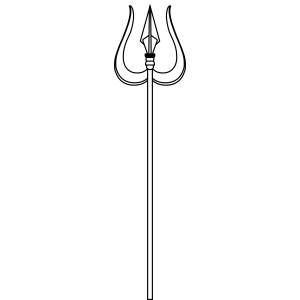 Temple, would go daily to see Śrī Gopīśvara Mahādeva at his temple. Once, in his older years, Sanātana Gosvāmī had a dream wherein Gopīśvara Mahādeva appeared and instructed him: “Now that you are old, please do not go through so much trouble to see me.” Sanātana Gosvāmī replied, “I will continue to come. I cannot change this habit.” Gopīśvara Mahādeva said, “Then I will come and stay very near to your residence, manifesting in Bankhaṇḍī.” The very next day, Śrī Gopīśvara Mahādeva appeared in Bankhaṇḍī, halfway between his original temple and Śrīla Sanātana Gosvāmī’s residence. Seeing this, Sanātana Gosvāmī became overwhelmed with transcendental ecstasy, and from that day on he visited Bankhaṇḍī Mahādeva every day.
Temple, would go daily to see Śrī Gopīśvara Mahādeva at his temple. Once, in his older years, Sanātana Gosvāmī had a dream wherein Gopīśvara Mahādeva appeared and instructed him: “Now that you are old, please do not go through so much trouble to see me.” Sanātana Gosvāmī replied, “I will continue to come. I cannot change this habit.” Gopīśvara Mahādeva said, “Then I will come and stay very near to your residence, manifesting in Bankhaṇḍī.” The very next day, Śrī Gopīśvara Mahādeva appeared in Bankhaṇḍī, halfway between his original temple and Śrīla Sanātana Gosvāmī’s residence. Seeing this, Sanātana Gosvāmī became overwhelmed with transcendental ecstasy, and from that day on he visited Bankhaṇḍī Mahādeva every day.
Wherever he was, Śrīla Sanātana Gosvāmī could not live without his beloved Lord Śiva – Gopīśvara Mahādeva and Bankhaṇḍī Mahādeva in Vṛndāvana, and Kāmeśvara Mahādeva in Kāmyavana forest. In Govardhana he would stay near his very dear friend, Cakreśvara Mahādeva, who acquired the name when he served Govardhana Hill and the Vrajavāsīs by holding up his trident like a cakra (disc weapon), protecting them from the torrential deluge sent by King Indra.
Prior to this, Lord Śiva had asked Śrī Kṛṣṇa for the boon to witness His childhood pastimes. Kṛṣṇa ordered him  to situate himself in Nandagaon in the form of a hill. Śiva followed this order and became Nandīśvara Hill, and he thus became known as Nandīśvara. (Lord Brahmā became Brahma-parvata, the mountain in Śrīmatī Rādhikā’s birthplace, Varṣāṇā. Because Brahmā is so near to Rādhikā, he is also our Gurudeva.)
to situate himself in Nandagaon in the form of a hill. Śiva followed this order and became Nandīśvara Hill, and he thus became known as Nandīśvara. (Lord Brahmā became Brahma-parvata, the mountain in Śrīmatī Rādhikā’s birthplace, Varṣāṇā. Because Brahmā is so near to Rādhikā, he is also our Gurudeva.)
We honour Lord Śiva as a great Vaiṣṇava and as Guru. We do not worship him separately. We observe Śiva-rātri, Lord Śiva’s appearance day, and we glorify him in connection to his relationship with Śrī Kṛṣṇa. Śrīla Sanātana Gosvāmī has written in his Hari-bhakti-vilāsa that all Vaiṣṇavas should observe Śiva-caturdaśī (Śiva-rātri). Lord Śiva, in whom all good qualities reside, should certainly be honoured by the observance of this day.
We offer obeisance to Lord Śiva with prayers like this:
vṛndāvanāvani-pate! jaya soma soma-maule
sanaka-sanandana-sanātana-nāradeḍya
gopīśvara! vraja-vilāsi-yugāṅghri-padme
prema prayaccha nirupādhi namo namas te
(Saṅkalpa-kalpadruma 103)
O Gatekeeper of Vṛndāvana! O Soma, all glories to you! O you whose forehead is decorated with the moon, and who is worshipable by the sages headed by Sanaka, Sanandana, Sanātana and Nārada! O Gopīśvara! Desiring that you bestow upon me prema for the lotus feet of Śrī Śrī Rādhā-Mādhava, who perform joyous pastimes in Vrajadhāma, I offer obeisances unto you time and again.
A brāhmaṇa in Kāśī (Vārāṇasī) once prayed to Lord Śiva, “I want to give my daughter in marriage, but I have no money. Please give me money.” Lord Śiva told him, “Go to Vṛndāvana and meet with Śrīla Sanātana Gosvāmī. You can ask him to give you some wealth for your daughter’s marriage.” The brāhmaṇa went to Vṛndāvana, by foot, and there he asked the villagers there for the whereabouts of a person named Sanātana Gosvāmī. As they 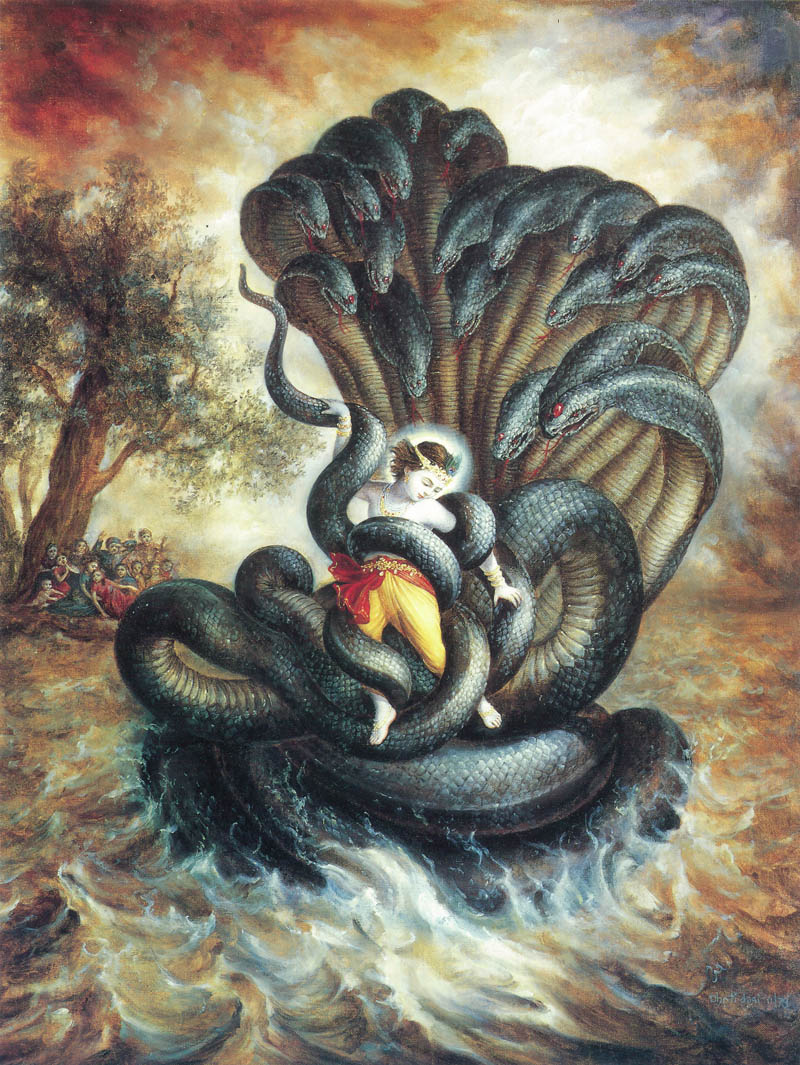 all knew him, they pointed out his residence.
all knew him, they pointed out his residence.
Śrīla Sanātana Gosvāmī was practising bhajana near the Yamunā River at Kāliya-hrada, the former abode of the very poisonous snake named Kāliya. Kāliya-hrada was close to the Yamunā, and therefore its surrounding area was full of sand. Śrīla Sanātana Gosvāmī wore only a loincloth. He used to go begging door-to-door for a small amount of prasāda (Kṛṣṇa’s food remnants) and would take as his meal only one dry capātī (flat bread), with no salt.
The brāhmaṇa arrived at his cottage and told him, “I went to Śaṅkara Mahādeva, Lord Śiva, and he told me to meet you. He said you will give me some wealth for my daughter’s marriage.” Sanātana Gosvāmī replied, “I have no possessions. You can see that I have nothing but a loincloth.” Then he thought, “Oh, Śiva cannot tell a lie. He is my bosom friend.” Thinking of Lord Siva and contemplating further, he remembered a touchstone he had once discarded and then forgotten. Now he told the brāhmaṇa, “Go to the Yamunā and remove some of the sand, and there you will find a touchstone. It is somewhere in the sand, though I don’t remember where.”
The brāhmaṇa found the jewel, touched it to iron, and the iron turned into gold. He was very, very happy that Lord Śiva had told him to come to Vṛndāvana, and thought with gratitude, “My prayer has been answered by him.” On the way home, however, his greed for money increased and he began thinking, “Why did Sanātana Gosvāmī keep the touchstone in the sand? It had no use there. He must have still more valuable jewels.”
He thus returned, and Sanātana Gosvāmī asked him, “Why have you come back?” He replied, “I’ve come because I know that you have more valuable jewels than this.” Sanātana Gosvāmī then said, “Go and throw the touchstone in the Yamunā. The brāhmaṇa did so with all his power, and then Sanātana Gosvāmī told him, “Come here. Come here.” He gave him the mantra, “Hare Kṛṣṇa Hare Kṛṣṇa Kṛṣṇa Kṛṣṇa Hare Hare, Hare Rāma Hare Rāma Rāma Rāma Hare Hare” and said, “I do not have worldly jewels, but I have transcendental jewels. The jewel of Lord Kṛṣṇa and Śrī Rādhā will come to you in a very short time. So remain here. Your daughter’s marriage will take place automatically. Stay here and chant Hare Kṛṣṇa.” That brāhmaṇa followed his instruction and became a very elevated saint.
* Lord Śiva was referring to the long history in relation to Śrīpād Śaṅkarācārya’s propagating the concept of the living entities’ oneness with God in all respects. Before the appearance of Śaṅkarācārya fifteen hundred years ago, voidist Buddhism, which rejects the Vedas, was prominent in India. Śaṅkarācārya is an incarnation of Lord Śiva, the topmost devotee of the Lord. However, in order to drive away Buddhism and re-establish Vedic authority, he had to compromise with the atheistic Buddhist philosophy and preach a non-devotional doctrine.
** “ In this case the special transforming agent is constituted of a mixture of māyā’s aspect of the mode of ignorance, the minuteness aspect of the marginal potency, and a slight degree of the combined knowledge (saṁvit) and bliss (hlādinī) aspects of the transcendental potency. The effulgent subordinate controller in the form of Śambhu-liṅga, being united with this special transforming agent, is constitutionally the semblance of God’s expansion.” (Brahma-saṁhitā commentary by Śrīla Bhaktivinoda Ṭhākura)
*** In his original and most pure form, Śiva is eternally Gopīśvara Mahadeva. Yet, he performed the following 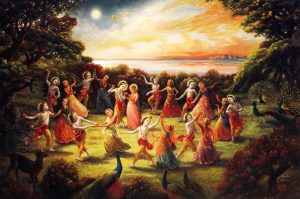 human-like pastime in which he ‘became’ Gopīśvara:
human-like pastime in which he ‘became’ Gopīśvara:
“Lord Śiva wanted to become a gopī. He performed austerities, and when Paurṇamāsī Yogamāyā became pleased and appeared before him, he prayed to join Kṛṣṇa’s rāsa-līlā. Paurṇamāsī mercifully assisted him in dipping in Brahmā-kuṇḍa, and he immediately assumed the form of a teenage gopī. He then went to the place where rāsa-līlā was being performed and hid there in a grove.
“Kṛṣṇa and the gopīs sensed that someone of a different mood had come. They asked each other, ‘Why are you not so happy today? What is the matter?’ After searching, they discovered the new gopī and asked ‘her’, ‘Who are you? What is your name? Who are your parents? What is your husband’s name? Where is your in-laws’ house?’
“When Śiva could not reply, they began to slap her so much that her cheeks became swollen and she began to cry, ‘Yogamāyā, Yogamāyā. Save me. I will never again come to Vṛndāvana, and I will never dare take part in rāsa-līlā.’ Paurṇamāsī arrived, and she requested the gopīs to show Lord Śiva mercy. ‘She is the object of my mercy,’ Paurṇamāsī told them. The gopīs then accepted her as a gopī and Kṛṣṇa named her Gopīśvara (she whose īśvaras, controllers, are the gopīs). He blessed her to become the guard of the rāsa-līlā and said, ‘Without the sanction of Gopīśvara, no one will be able to enter the rāsa-līlā.’ ” (Pinnacle of Devotion)
Source: Purebhakti.com
Image/Art made possible by Pixabay.com, Krishnapath.org and/or Bhaktiart.net
Unless indicated differently, all verse translations and quotes are from the books by Śrīla Bhaktivedānta Svāmī Mahārāja Prabhupāda (Vedabase.com)